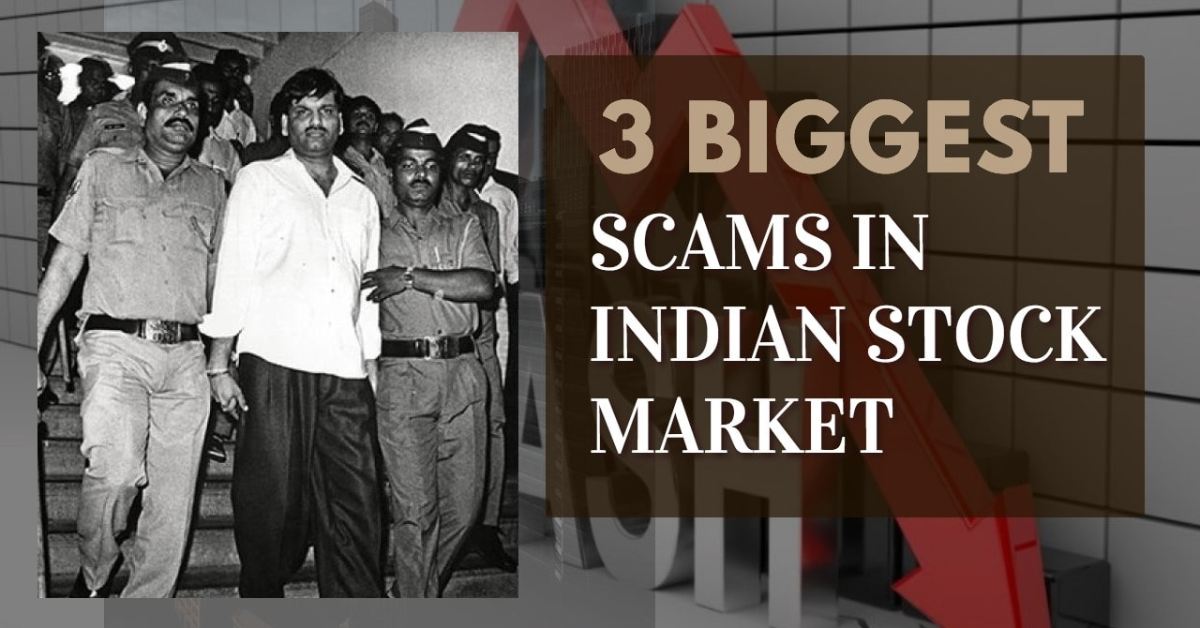The Indian stock market has seen remarkable growth, attracting millions of investors. However, it has also witnessed some of the most infamous financial scams, leading to huge losses and regulatory changes. Stock market frauds not only manipulate markets but also shake investor confidence.
In this blog, we will discuss:
✅ Major stock market scams in India
✅ How these scams were executed
✅ Legal consequences and SEBI’s role
✅ How investors can protect themselves
What is a Stock Market Scam?
A stock market scam involves fraudulent practices like insider trading, price manipulation, and Ponzi schemes that deceive investors for financial gain. Such scams often exploit regulatory loopholes, using market influence to artificially inflate or crash stock prices.
Major Stock Market Scams in India
1. Harshad Mehta Scam (1992) – ₹4,000 Crore Fraud
The Scam:
Harshad Mehta, a stockbroker, exploited the banking system loopholes to manipulate stock prices artificially. He diverted funds from banks into the stock market, creating an artificial bull run in shares like ACC, SBI, and Reliance.
Impact:
📉 The stock market crashed by 72%, causing massive investor losses.
📉 SBI and other banks faced huge financial instability.
📉 The scam exposed weak financial regulations in India.
Legal Consequences:
✔ Harshad Mehta was arrested in 1992 and faced multiple lawsuits.
✔ SEBI was empowered to regulate financial transactions strictly.
✔ Stricter banking system reforms were introduced.
2. Ketan Parekh Scam (2001) – ₹1,000 Crore Fraud
The Scam:
Ketan Parekh, a stockbroker, manipulated stock prices through the Pump and Dump scheme. He borrowed money from banks and mutual funds to buy shares of weak companies, inflating prices before selling them off for profit.
Impact:
📉 Several small investors lost their entire savings.
📉 The UTI Mutual Fund collapsed, leading to financial instability.
📉 The stock market suffered a major crash.
Legal Consequences:
✔ Ketan Parekh was banned from stock trading for 14 years.
✔ Stock market surveillance systems were strengthened.
✔ New laws were introduced to prevent fraudulent lending practices.
3. Saradha Chit Fund Scam (2013) – ₹2,460 Crore Ponzi Scheme
The Scam:
The Saradha Group ran a Ponzi scheme, promising high returns to investors in West Bengal, Assam, and Odisha. The company used new investments to pay older investors, creating a fraudulent financial cycle.
Impact:
📉 Over 1.7 million investors lost their money.
📉 Political links to the scam were exposed, leading to high-profile arrests.
📉 The scam triggered strict regulations on chit funds and Ponzi schemes.
Legal Consequences:
✔ The Saradha Group CEO was arrested, and the case was handed over to CBI.
✔ SEBI imposed strict rules on chit fund companies.
✔ Several politicians were investigated for their involvement.
4. NSE Co-Location Scam (2015-2022) – Algorithm Trading Fraud
The Scam:
High-frequency traders (HFT) and brokers at the National Stock Exchange (NSE) gained unfair access to stock data through the exchange’s co-location servers, giving them a trading advantage over retail investors.
Impact:
📉 Loss of investor trust in the fairness of NSE operations.
📉 Regulatory weaknesses in algorithm-based trading were exposed.
📉 NSE’s credibility suffered, affecting international investments.
Legal Consequences:
✔ NSE officials, including the ex-CEO, were investigated and fined.
✔ SEBI imposed heavy penalties and increased surveillance on high-frequency trading.
✔ Stricter rules for algorithmic trading and server access were introduced.
5. Karvy Stock Broking Scam (2019) – ₹2,000 Crore Misuse of Client Funds
The Scam:
Karvy Stock Broking illegally pledged client shares as collateral to borrow funds from banks and other institutions.
Impact:
📉 Investors lost huge sums, as their stocks were wrongfully pledged.
📉 Major financial institutions faced heavy losses.
📉 The stockbroking industry faced tighter SEBI regulations.
Legal Consequences:
✔ SEBI banned Karvy from stock market activities.
✔ New investor protection measures were introduced.
✔ The scam led to stricter client fund management rules.
Legal Framework and SEBI’s Role in Preventing Stock Market Scams
To prevent stock market frauds, India has strict laws and regulatory bodies like:
🔹 Securities and Exchange Board of India (SEBI) – Regulates the stock market, prevents fraud, and takes action against violators.
🔹 The Companies Act, 2013 – Ensures transparency in corporate governance.
🔹 The Prevention of Money Laundering Act, 2002 (PMLA) – Prevents illegal financial transactions.
🔹 The Reserve Bank of India (RBI) – Monitors banking transactions to prevent financial frauds.
🔹 The Depositories Act, 1996 – Protects investor rights and ensures proper shareholding records.
How Investors Can Protect Themselves from Stock Market Scams?
✅ Avoid Pump and Dump Schemes – If a stock price rises abnormally fast without strong fundamentals, be cautious.
✅ Verify Investment Schemes – Never invest in schemes promising unrealistic high returns.
✅ Use SEBI-Registered Brokers – Always trade through regulated stockbrokers.
✅ Monitor Your Demat Account – Regularly check your holdings and transactions.
✅ Be Aware of Algorithmic Trading Risks – Understand how HFT and AI-based trading affect stock prices.
✅ Follow Market News and SEBI Alerts – Stay updated on financial regulations and fraud warnings.
Conclusion
Stock market scams in India have caused huge financial losses and shaken investor confidence. However, with stricter regulations, digital surveillance, and investor awareness, such frauds can be minimized.
SEBI and other regulatory bodies continue to strengthen the legal framework, ensuring safer investments and a transparent financial ecosystem. As investors, it’s crucial to stay vigilant, informed, and cautious to avoid falling victim to stock market fraud.
📢 Have you ever been affected by a stock market scam? Share your experience in the comments!

